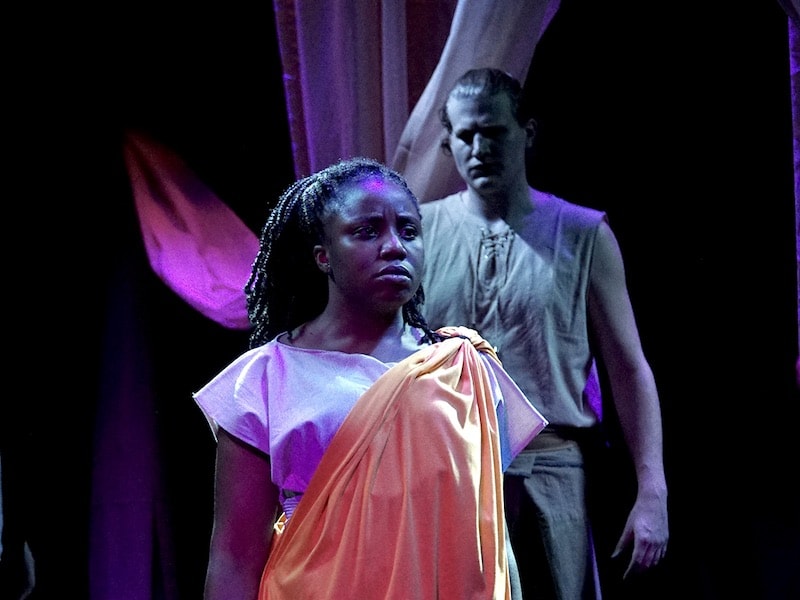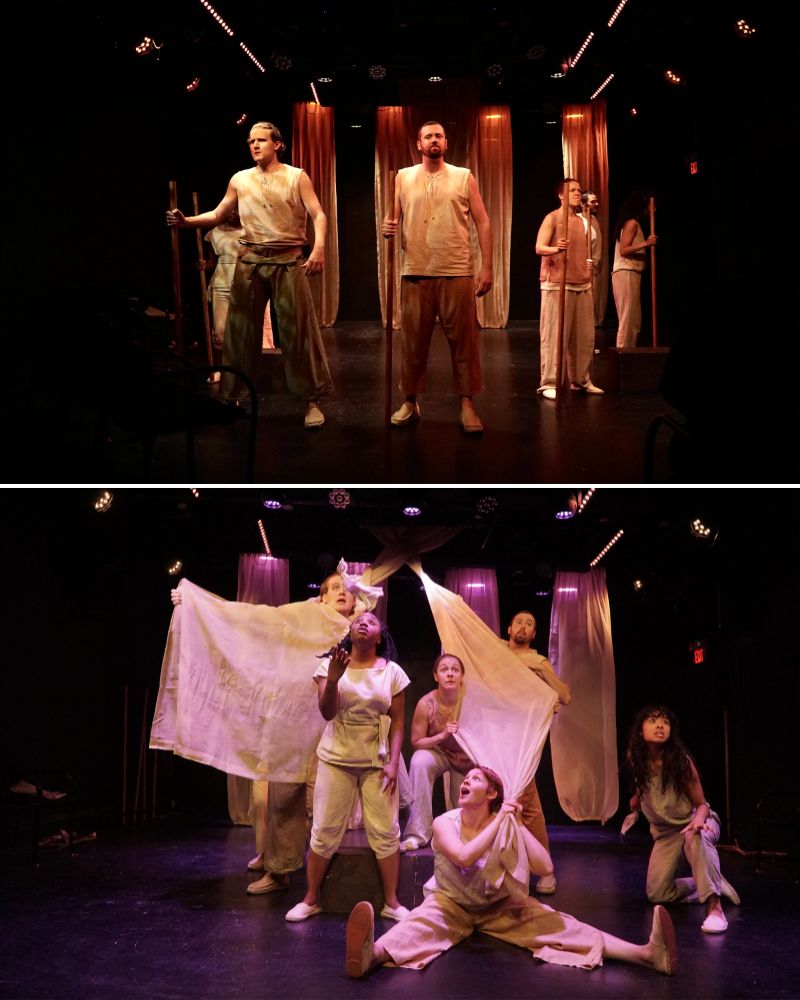In an intimate performance space like that of the Capitol Hill Arts Workshop, it is possible to convey the deepest of feelings, the most dramatic of moments, in subtle, varied, and nuanced ways. So why the incessant shouting in We Happy Few’s presentation of Iphigenia, Kerry McGee’s adaptation of the foundational Greek tragedy?
Robert Pike, as Menelaus, is probably the champion shouter of the group,pu though often matched in volume by Matthew Sparacino as Agamemnon and Joshua Williams as Achilles. The chorus, consisting of the entire cast, shouts, usually in unison. Adding to the din, chorus members frequently bang wooden poles on the floor, though it is not always clear what, if anything, they are trying to emphasize.
Granted, the story’s emotions are intense. Agamemnon, leader of the Greek expedition to attack Troy, finds his fleet becalmed. The god Artemis informs him that to get favorable winds, he must sacrifice his daughter, Iphigenia. His duties as a father and as a military leader conflict. Iphigenia’s desire to live a good life conflicts with her sense of duty to her father and the Greek cause. But a useful distinction can be drawn between dramatic intensity and decibel level, something that Debora Crabbe, in the title role, grasps better than her male counterparts.

Directed by Emila Pazniokas and Jennifer Hopkins, the production’s concept may be that an in-your-face presentational approach gives the audience a sense of the mythology and ritual underlying Greek tragedy. This possibility is underlined by the choreography given the chorus, who, while at times carrying out quite intricate movement (playing keep-way with an important letter is a nice example), often deploy in a hunched-over stomping mode. Voiced by Carolyn Krashner, who also portrays Clytemnestra, Iphigenia’s distraught mother, Artemis, booms out her commands, emphasizing the strangeness of an ancient worldview in which mortals do not question gods’ edicts, however arbitrary and cruel.
The other important part of the play’s concept is uncertainty: what actually happens to Iphinegia and through what chain of events? Is she actually killed? Is someone else with the same name killed in her stead? Does the sacrifice of a deer instead of a woman satisfy a jealous god? Any of these possibilities exist in the source materials — primarily Euripides’ Iphigenia in Aulis and Racine’s Iphigénie — and McGee organizes them in three discrete sections of the play. McGee’s script has the virtue of not providing a definitive answer, leaving the uncertainty intact.
The first section more or less tracks the Euripides version, to the point where Agamemnon is about to slit Iphigenia’s throat. Full stop, regroup. The second section, heavily influenced by Racine, explores the possibility that Eriphyle (Bri Houtman) — jealous of the attention and love focused on Iphigenia, and related to other characters in a way that is not disclosed until the end of the section — may be an alternative sacrifice. Full stop, regroup. The third section, closely related to the second, focuses on Iphigenia’s reconsideration of who she is, what she will choose, and why.
Exploring alternative tellings of a storyline, changing details that can have large effects on its conclusion, is a valid way of structuring a play. Michael Frayn’s Copenhagen, with its elegant transitions among a series of “thought experiments” in the context of great uncertainty, may well be the gold standard of this technique. In Iphinegia, the transitions are abrupt and feel like an awkward academic exercise. The repetition of details that aren’t changed among the sections can readily become tedious.
Amidst the noise, what of the characters? Agamemnon is a semi-comic figure, weak, vacillating, insecure in his position, and easily manipulated by whoever has talked to him last, a sort of Bronze Age Kevin McCarthy. Achilles’ efforts to help Iphigenia escape her fate are out of a warrior’s pride, not love or compassion. He’s the sort of ancient hero spoofed by Miles Gloriosus in A Funny Thing Happened on the Way to the Forum. Menelaus is a figure of bluster and, because his wife has run off to Troy with her lover, ridicule.
Particularly in the second and third sections, Iphigenia and Eriphyle have the opportunity to process their thoughts and feelings in detail, and Crabbe and Houtman take good advantage of the opportunities to develop their characters. By the third section, each of them has grown into a sense of their agency to make decisive choices about their lives. Though somewhat at odds with the play’s mythic underpinnings, McGee achieves her objective of presenting a “real Iphigenia hidden in the myth” to which a contemporary audience can relate.

The technical side of the production is well executed. Maria Bissex gives the company loose-fitting, neutral-colored costumes, with more colorful capes and other pieces for scenes in which they are playing named characters. Robert Pike’s sound design is dramatic, featuring percussion, and having interesting moments to accompany mimed storytelling by a character. The key feature of Jon Reynolds’ set design is a half dozen long sheer fabric panels, four in fixed positions and the other two of which are reconfigured from time to time to represent, for example, a tent. Paige O’Malley also designed a puppet, a set of tree branches combined by chorus members to represent a deer.
A good deal of thought went into the production, and the actors did well at executing the intent of the playwright and directors. Overall, however, Iphigenia cannot be reckoned a success, its structural issues and declamatory style getting in the way of its storytelling.
Running Time: One hour and 40 minutes, with no intermission.
Iphigenia plays through June 17, 2023, presented by We Happy View at the Capitol Hill Arts Workshop, 545 7th Street SE, Washington, DC. Tickets, priced from $25, are available online.
The program for Iphigenia is online here.
COVID Safety: Audiences must take a temperature check upon entering the venue. All audience members must remain masked throughout the performance.
Iphigenia
A new telling (and re-telling) from Kerry McGee
Directed by Emilia Pazniokas & Jennifer Hopkins
FEATURING
Debora Crabbe, Bri Houtman, Carolyn Kashner, Mary Myers, Robert Pike, Matt Sparacino, & Joshua Williams
DESIGN
Kerry McGee (producing)
Makenzi Wentela (stage management)
Kerry McGee (graphic design)
Rachel Dixon (production management)
Jason Aufdem-Brinke (lighting design)
Camille Kashaka (assistant lighting design)
Robert Pike (sound design)
Jon Reynolds (set design)
Maria Bissex (costume design)
Robert Pike and Kerry McGee (props design)
Paige O’Malley (puppet design)
Keith Hock (dramaturgy)




